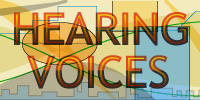Dream of Democracy: Politics of Youth

 7:30
Barrett Golding & Jonathan Menjivar
7:30
Barrett Golding & Jonathan Menjivar
Have you ever been politicial?
Broadcast: Jul 28 2004 on NPR Day to DaySeries: Dream of Democracy Subjects: Politics, Youth, Public Affairs
Profile: Chicago-area college students talk about their concept of democracy and what it means to them
September 1, 2004 from Day to Day
NOAH ADAMS, host: Candidates, elections, voting; all these are essential components of a democracy. But how much does that concept `democracy' resonate with young people? Producers Jonathan Menjivar and Barrett Golding recorded the thoughts of college students in the Chicago area.
(Soundbite of music)
Unidentified Student #1: Democracy?
Unidentified Student #2: Democracy...
Unidentified Student #3: Democracy?
Unidentified Student #4: What I think about democracy?
Unidentified Student #1: I have no idea, man, honestly. No clue.
Unidentified Student #5: I really have no idea what democracy is supposed to be, or what it means.
Unidentified Student #3: What do you mean, like, our form of government?
Unidentified Student #6: It's great in theory.
Unidentified Student #3: I think it works well.
Unidentified Student #6: Much like communism.
Unidentified Student #3: Better than communism.
Unidentified Student #1: Like liberty and the pursuit of happiness, all that junk--I mean, everyone's all for that. But people, to me, just seem more interested in the pursuit of money.
Unidentified Student #7: All the presidents and all that--they're all rich people.
Unidentified Student #8: It's been this way for more than 200 years, and it's worked so far and I think it is still working. I don't think we need great change or a revolution or...
Unidentified Student #9: Democracy, in general, is probably a good idea. But if you look at, like, the Greeks, which is what we base our system on--I mean, the Greeks fell, so we have to be careful. We have to be careful not to hate each other over things like politics and democracy.
Unidentified Student #10: I don't pay attention to politics, and I don't know enough to make an educated vote. Like, I should; I know that. But it's just kind of worrying.
Unidentified Student #11: I'm definitely not voting. I'm not voting this year.
Unidentified Student #12: I'll vote, but that's it. That's the most I'm going to get involved.
Unidentified Student #13: Because most of the people who vote just don't even really think about. I mean, you usually only have, like, three candidates to choose from and it's either, you know, Republican, Democrats or some Green Party or something like that.
Unidentified Student #14: And most people might think that their votes will count quantitatively, and it doesn't, because the Electoral College is really casting the votes. I don't know who the Electoral College is. I doubt that anyone in this room knows. You know who they are?
(Soundbite of music)
Unidentified Student #15: The percentage of people that actually do vote is ridiculously low. And if we actually got people out there to vote and speak their mind, then maybe things would change.
Unidentified Student #16: Some people have a completely different take on politics. It's a lot more aggressive, a lot more physical because they're willing to literally fight for what they believe in.
(Soundbite of music)
Unidentified Student #17: You're not taught to do something extraordinary. You know, it's so easy just to say, `I'm going to grow up, go to college, get out, have a nice job.'
Unidentified Student #18: There's not many people that can make a difference. And even if you do, it's kind of like if you're a social worker, say, you're going to impact other people's lives, but at the same time, you're going to get paid less. So it's like the system's set up to make people who want to make a difference to, like, not get rewarded at times.
Unidentified Student #19: You can vote, you can stay informed, but then, you know, to actually go out and actively do something for your cause is, like, the best thing you can do, you know. Like, voting is good; everybody should do it. But it's not enough.
Unidentified Student #20: Passing out fliers, brochures, talking about the issues with people.
Unidentified Student #19: You just have to care and just realize that everything affects us.
(Soundbite of music)
ADAMS: That piece was produced by Jonathan Menjivar and Barrett Golding, part of the series "Chicago Matters: Our Next Generation" from Chicago Public Radio.
(Soundbite of music)
ADAMS: This is DAY TO DAY from NPR News.

